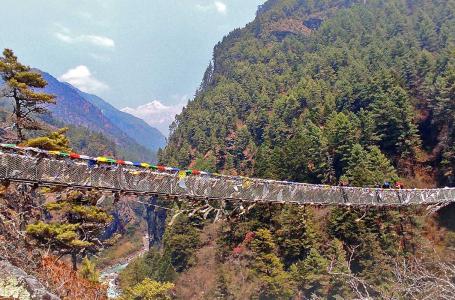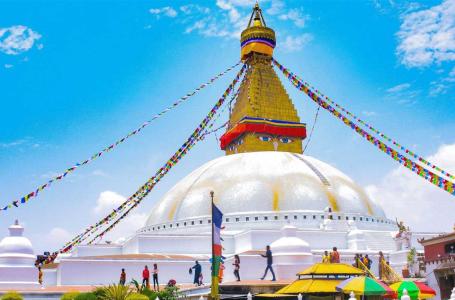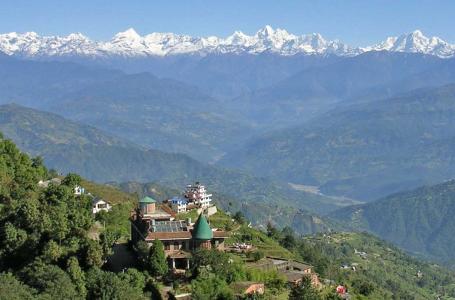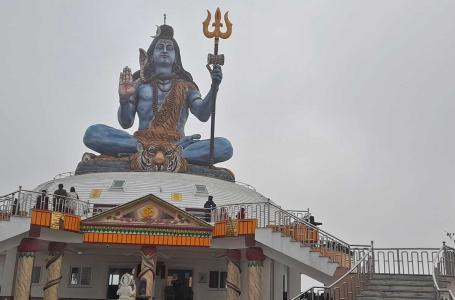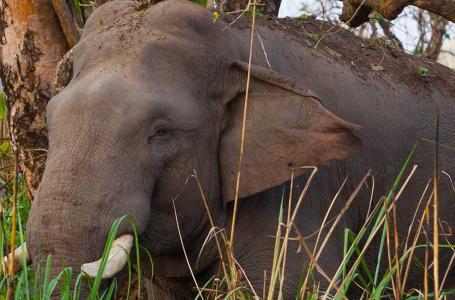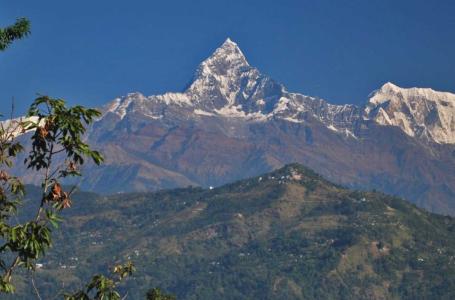Climbing Mera Peak, which stands tall at the elevation of 6,461m/21,193ft above sea level is one of the adventure activities in the bucket list of climbing enthusiasts worldwide. The Mera Peak is a highest trekking peak in Nepal which offers astounding vistas of mountain ranges including Everest, Lhotse, Cho Oyu, Makalu, and Kanchenjunga which are above 8,000m. Likewise, we can also sight more than a dozen peak which are above 6,000m from the summit of Mera Peak.
Mera Peak Climbing is an adventurous and rewarding journey not just for the mountain panorama but also for the natural landscapes, flora and fauna, Sherpa culture, food and cuisine, and many other additional perks of trekking and expedition in the Everest region of Nepal.
Generally, the Mera Peak Climbing program initiates with a scenic and thrilling flight from Kathmandu to Lukla, Tenzing-Hillary Airport and following the trail via Khare. At Khare, the trekkers are provided with equipment training and prepare for climbing Mera Peak. Likewise, the day is also allocated for the acclimatization before reaching Mera Peak Summit. It is an important to have an acclimatization before proceeding to a higher elevation so as to prevent AMS.
Nowadays, many trekkers and expedition enthusiasts prefer to trek up to Khare on their own prefer to acquire Mera Base Camp Service from Khare. The Base Camp Service from Khare for Mera Peak Climbing is getting popular among independent adventure seekers.
This is not just budget friendly, but also provides the trekkers with freedom of trekking on their own at their own pace and exploring the trekking route as per their preferences.
Nevertheless, the Mera Peak from Khare is also suitable for those who are short of time and just want to reach the Mera Summit escaping the prolonged route. Hence, the base camp service is one of the best alternative for those who want to summit Mera Peak but trek up to Khare independently.
For the months of March, April, and May, the permit costs USD $250, as these months offer ideal conditions with clear and mild weather. In contrast, during September, October, and November, the permit fee is USD $125 for the autumn season, which is a popular time for Mera Peak Climbing. The permit price is lower during the winter and summer months, which are considered off-seasons. Moreover, for December, January, and February, the permit fee is USD $70.
Our Mera from Khare, base camp service varies from 1 night 2 days to 3 night 4 days in service depending upon the preference of the trekker. As well as, the experience, fitness, and the requirement of the Mera Peak climber. However, we highly recommend our 3 days Khare to Mera Peak Program which covers the training as well as acclimatization. Similarly, we can facilitate the rental of required group climbing equipment from Khare which comes handy for the trekkers to reduce the burden of carrying them throughout entire trekking route.
However, the required document and permits for Mera Peak Climbing has to be issued in Kathmandu. Trek Mania Nepal will get is ready for you and deliver to Khare with our crew. Thus, our 3 Days Mera Peak Climbing from Khare program is a best adventure program for trekking and climbing enthusiasts. Join us today for this remarkable Peak Climbing in Nepal experience.
Feel free to contact us today to plan and organize your spine-tingling Khare to Mera Peak Climbing program with Trek Mania Nepal in 2024/2025. Also, if you would like to embark with us on our regular 22 Days Mera Peak Climbing starting from Kathmandu, please do mention in your email. We are flexible with the required amendments in the program and deliver the service with complete satisfaction to our guests.
As you arrive at Khare, your body needs to acclimatize before embarking above the elevation of 5,000m. It is not just for the purpose of rest for your body but also to prevent any kind of AMS which might occur due to sudden change in the altitude.
This day is also allocated for the equipment usage training and climbing preparation which is very essential for a successful ascend to Mera Peak Summit.
Today, you will meet our crew and they will guide you with the rest of the information and planning. After exploring nearby destinations and climbing preparation, we stay overnight in a Lodge/Tea-House at Khare.
Early morning after breakfast, we step ahead to Mera Base Camp to reach Mera High Camp. The walk will take us along the Mera Glacier, through snowy and ice terrain, steadily increasing height.
During our ascend, we will be treated with breathtaking vistas of the neighboring peaks, which includes Everest, Lhotse, Nuptse, Makalu, Kanchenjunga and many other peaks above 6,000m.
Mera High Camp stands at an elevation of around 5,800 meters (19,029 ft) where climbers relax and prepare for their summit. We rest up for the day at the base and prepare for the big day ahead. Overnight in a tent-camp.
Today is an important day for us, so we'll get up early and have a proper breakfast. Climbing Mera Peak allows you to experience high-altitude mountaineering and see breathtaking views from the peak. The climb entails maneuvering through difficult terrain and may necessitate the use of crampons and ropes.
Climbing Mera Peak necessitates good planning, physical fitness, and climbing abilities. To guarantee safety and success, this adventure must be undertaken with the assistance of an experienced climbing guide and support crew. So, we'll make our way up to the peak slowly and safely.
You'll be treated to breathtaking vistas of the Everest region's renowned peaks during the journey and ascent. When we reach the top, we will be rewarded with stunning panoramic views of the world's tallest mountains, including Everest, Lhotse, Makalu, Cho Oyu, and others. After spending some time at the peak, we will return to Mera High Camp and continue walking back to Khare for a well-deserved break.
Trip Start and End Point
Kathmandu / Kathmandu
| DATES | STATUS | PRICE | SPACE LEFT | ||||
|---|---|---|---|---|---|---|---|
|
Start date: 25-May, 2025
End date: 27-May, 2025 |
Guaranteed | USD 690 |
2
|
Book Now | |||
|
Start date: 09-Sep, 2025
End date: 12-Sep, 2025 |
Guaranteed | USD 690 |
2
|
Book Now | |||
|
Start date: 05-Oct, 2025
End date: 07-Oct, 2025 |
Guaranteed | USD 690 |
1
|
Book Now | |||
|
Start date: 17-Oct, 2025
End date: 19-Oct, 2025 |
Guaranteed | USD 690 |
1
|
Book Now | |||
|
Start date: 29-Oct, 2025
End date: 31-Oct, 2025 |
Guaranteed | USD 690 |
2
|
Book Now | |||
|
Start date: 05-Nov, 2025
End date: 07-Nov, 2025 |
Guaranteed | USD 690 |
1
|
Book Now | |||
|
Start date: 23-Nov, 2025
End date: 25-Nov, 2025 |
Guaranteed | USD 690 |
3
|
Book Now | |||
Equipment Checklist for Peak Climbing in Nepal
For Head
· Balaclava that covers your ears
· Headlamp with spare batteries and bulbs
· Bandana or headscarf, particularly useful in dusty conditions
· Beanie
· Wide-brimmed sunhat
· Neck gaiter or warmer
· Snow goggles and sunglasses with UV protection
(carry an extra pair in case of loss or breakage)
· Prescription sunglasses (if needed)
For Upper Body
· Moisture-wicking and breathable t-shirt
· Merino wool thermal base layer
· Fleece wind-stopper jacket or pullover
· Waterproof (preferably breathable fabric)
· Long-sleeve shirt (moisture-wicking and breathable)
· Shell jacket
· Down vest
· Insulated down jacket with hood for extreme conditions
(not necessary for all trekking peaks)
· Gore-Tex jacket with hood, waterproof and breathable
For Hands
· Lightweight poly-liner gloves or wool/fleece gloves
· Summit mittens
(insulated gloves with safety straps)
For Lower Body
· Merino wool thermal leggings
· Waterproof, breathable trekking trousers
· Hardshell trousers
· Non-cotton underwear briefs
· Hiking shorts
· Synthetic insulated pants
For Feet
· Crampons
· Lightweight inner socks, heavy poly or wool socks, and cotton socks
· Running shoes and rubber sandals/flip-flops
· Double-insulated climbing boots
· High-quality hiking boots
(durable soles, water-resistant, ankle support, well broken-in)
· Gaiters
For Sleeping
· 5-season sleeping bag suitable for temperatures as low as -40°C
· Foam pad
· Fleece sleeping bag liner
· Therm-a-Rest sleeping pad (NeoAir XTherm) for insulation and warmth in sub-freezing temperatures
· Pillowcase
Personal Climbing Equipment
Ice axe
Crampons
Ascender/Jhumar
Prusik rope
Helmet
Harness
Tape slings (2)
Screwgate karabiners (2 locks, 2 unlock)
Descender/eight-figure
Plastic mountaineering boots
Group Climbing Equipment
Snow bar
Rope
Ice hammer
Ice screw
Baggage
Rucksack and Luggage
A compact daypack/backpack (30-40L) with adequate shoulder padding for carrying valuables.
Large duffel bag (80-100L)
Small padlocks for duffel bags
Medical Supplies
Compact personal first-aid kit (lightweight and basic)
Paracetamol
Cough and/or cold medicine
Anti-altitude sickness pills - Diamox or Acetylzolamide
Stomach antibiotic - Ciprofloxacin, etc. Avoid bringing sleeping pills due to respiratory depression risks.
Skin-blister repair kit
Anti-diarrhea pills
Throat lozenges
Water purification tablets or a water filter
Earplugs
Lip balm
Eye drops
Extra pair of prescription glasses, contact lens supplies
Sunscreen
Essential Items
Alarm clock/watch
Camera with spare SD cards and batteries
Large Ziploc bags
2 water bottles (1 liter each)
Small roll of repair tape, sewing kit
Binoculars (optional)
4 large, waterproof, disposable trash bags
Type C adapter (with circular pins)
Cigarette lighter / small box of matches
Compass or GPS (optional)
Lightweight steel thermal bottle
Compact folding or Swiss knife
Foldable trekking poles
Toiletries
Deodorant
Nail clippers
Face and body moisturizer
Female hygiene products
Small mirror
Medium-sized quick-drying towel
Toothbrush/paste (preferably biodegradable)
Multipurpose soap (preferably biodegradable)
Personal Hygiene
Antibacterial handwash
Hand sanitizer
Pee Bottle (1 liter, leak-proof, wide mouth)
Pee funnel (for females)
Wet wipes (baby wipes)
Tissues/toilet paper
Extras/Luxuries
Reading book
Trail map/guidebook
Journal and pen
Playing cards (for entertainment at teahouses and camps)
Modest swimsuit
Binoculars (optional)

